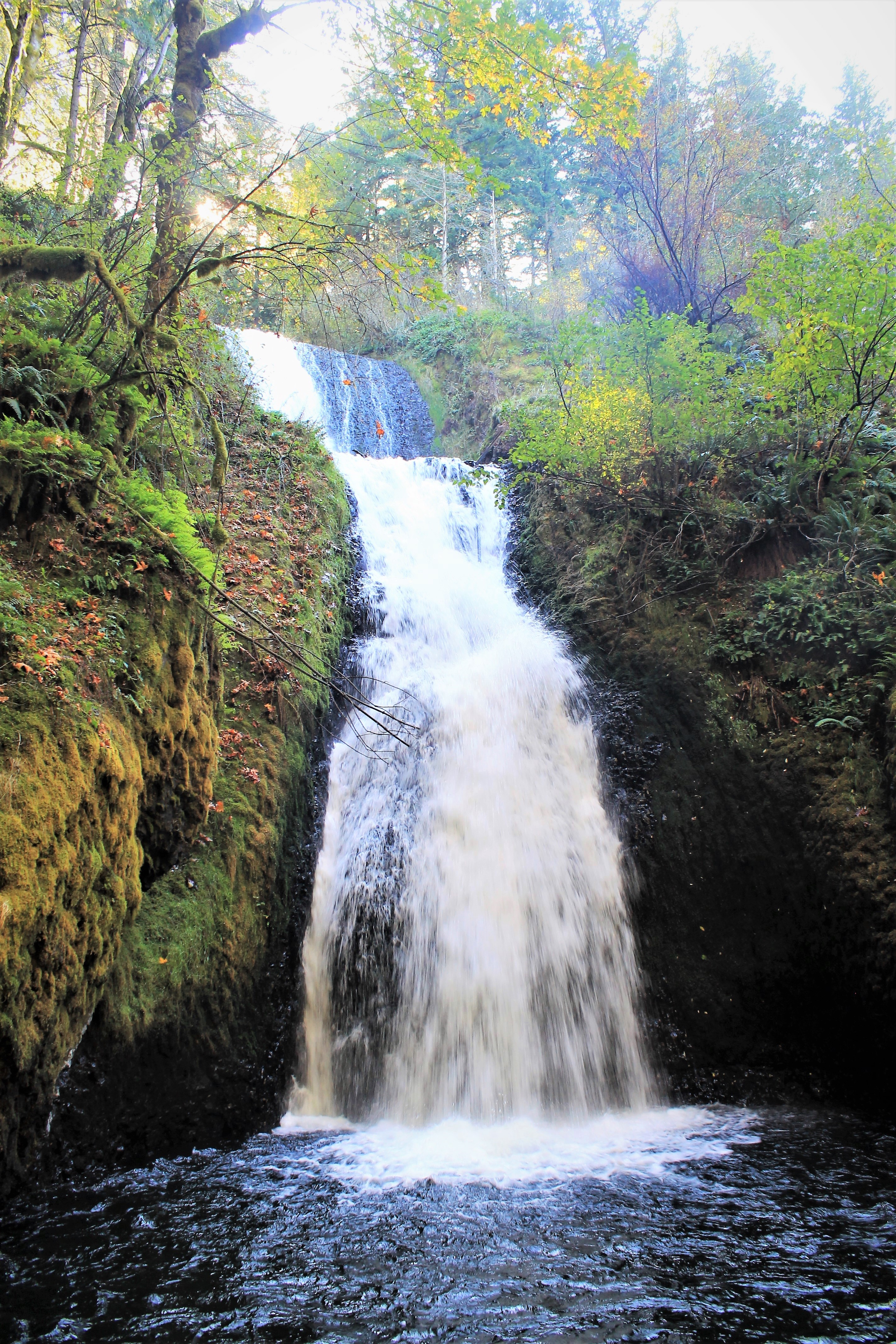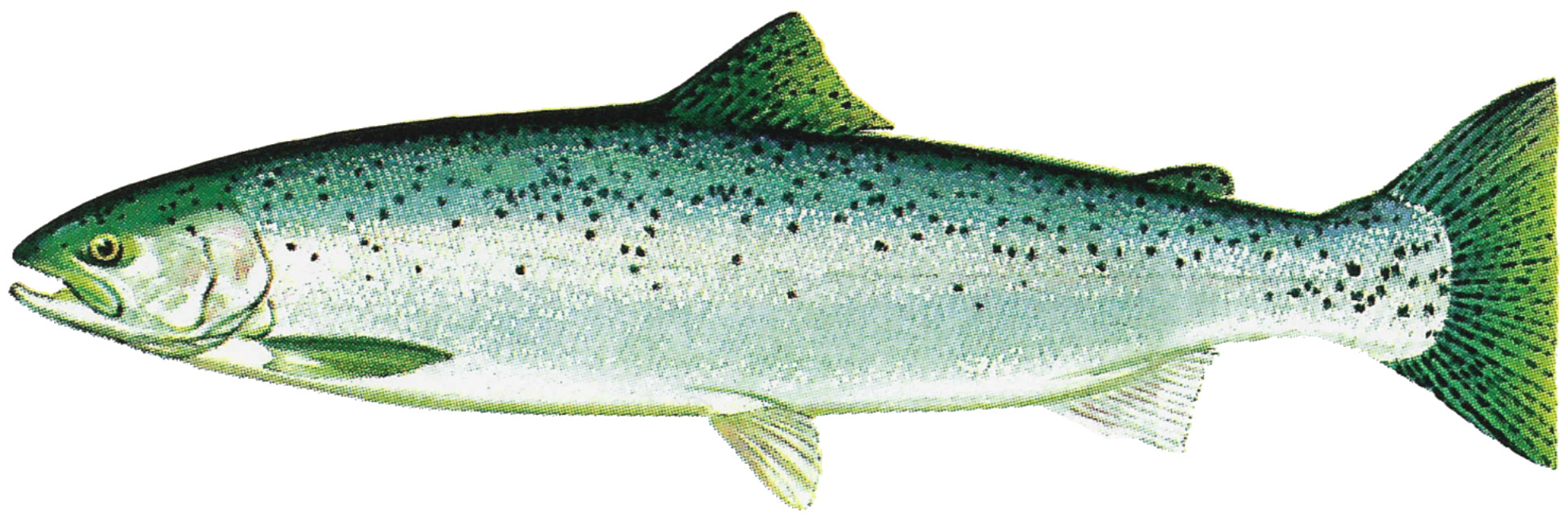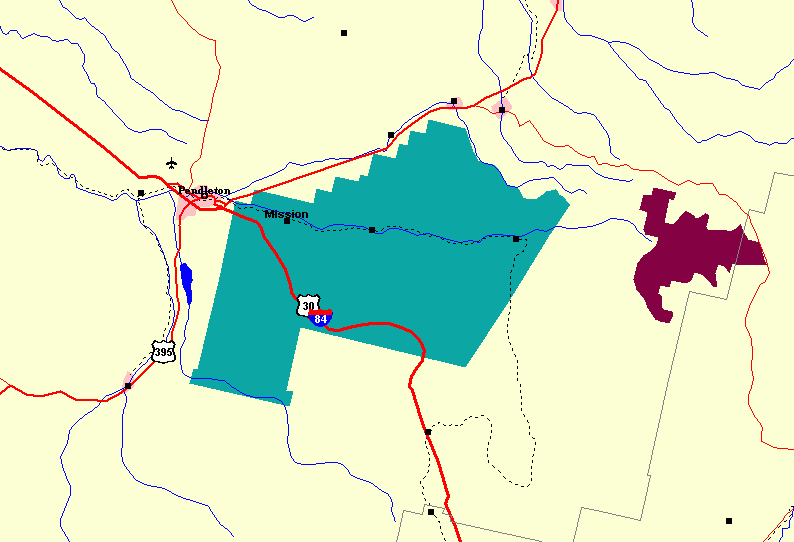|
Celilo Village, Oregon
Celilo Village, Oregon is an unincorporated Native American community on the Columbia River in northeastern Wasco County in the U.S. state of Oregon. It is near Lake Celilo, the former site of Celilo Falls; it is just south of the community of Wishram, Washington, across the Columbia River. In 2003 about 100 permanent residents lived in 14 dwellings. The site was once a major cultural and trading center, until Celilo Falls was inundated by The Dalles Dam in 1957. The 2000 census reported a total resident population of 44 persons living on a land area of 102.11 acres (0.4132 km). The United States Army Corps of Engineers provided funding for construction of a new tribal long house in 2006. Most residents of Celilo are members of either the Yakama Nation or Confederated Tribes of Warm Springs. Some may be members of the Confederated Tribes of the Umatilla Indian Reservation, or the Nez Perce tribe. Many residents are fishers engaging in ceremonial, subsistence, and commerc ... [...More Info...] [...Related Items...] OR: [Wikipedia] [Google] [Baidu] |
0560T Celilo Village Locator Map , a bus route in the United Kingdom
{{Numberdis ...
56 may refer to: * 56 (number) * one of the years 56 BC, AD 56, 1856, 1956, 2056 * 56.com, a Chinese online video platform * Fiftysix, Arkansas, unincorporated community in United States * Fifty-Six, Arkansas, city in United States * "Fifty Six", a song by Karma to Burn from the album ''Arch Stanton'', 2014 * Cityrider 56 Cityrider is a bus service in Tyne and Wear, England, which connects Springwell Village, Wrekenton, Gateshead and Newcastle upon Tyne with Washington, Hylton Castle and Sunderland. History The service was formerly branded as ''Fab Fifty Six ... [...More Info...] [...Related Items...] OR: [Wikipedia] [Google] [Baidu] |
United States Army Corps Of Engineers
, colors = , anniversaries = 16 June (Organization Day) , battles = , battles_label = Wars , website = , commander1 = LTG Scott A. Spellmon , commander1_label = Chief of Engineers and Commanding General of the U.S. Army Corps of Engineers , commander2 = MGbr>Richard J. Heitkamp, commander2_label = Deputy Chief of Engineers and Deputy Commanding General , commander3 = MGKimberly M. Colloton, commander3_label = Deputy Commanding General for Military and International Operations , commander4 = MGbr>William H. Graham, commander4_label = Deputy Commanding General for Civil and Emergency Operations , commander5 = COLbr>James J. Handura, commander5_label = Chief of Staff for the U.S. Army Corps of Engi ... [...More Info...] [...Related Items...] OR: [Wikipedia] [Google] [Baidu] |
Columbia River Gorge
The Columbia River Gorge is a canyon of the Columbia River in the Pacific Northwest of the United States. Up to deep, the canyon stretches for over as the river winds westward through the Cascade Range, forming the boundary between the state of Washington to the north and Oregon to the south. Extending roughly from the confluence of the Columbia with the Deschutes River (and the towns of Roosevelt, Washington, and Arlington, Oregon) in the east down to the eastern reaches of the Portland metropolitan area, the water gap furnishes the only navigable route through the Cascades and the only water connection between the Columbia Plateau and the Pacific Ocean. It is thus that the routes of Interstate 84, U.S. Route 30, Washington State Route 14, and railroad tracks on both sides run through the gorge. A popular recreational destination, the gorge holds federally protected status as the Columbia River Gorge National Scenic Area and is managed by the Columbia River Gorge Commi ... [...More Info...] [...Related Items...] OR: [Wikipedia] [Google] [Baidu] |
Native American History Of Oregon
Native may refer to: People * Jus soli, citizenship by right of birth * Indigenous peoples, peoples with a set of specific rights based on their historical ties to a particular territory ** Native Americans (other) In arts and entertainment * Native (band), a French R&B band * Native (comics), a character in the X-Men comics universe * ''Native'' (album), a 2013 album by OneRepublic * ''Native'' (2016 film), a British science fiction film * '' The Native'', a Nigerian music magazine In science * Native (computing), software or data formats supported by a certain system * Native language, the language(s) a person has learned from birth * Native metal, any metal that is found in its metallic form, either pure or as an alloy, in nature * Native species, a species whose presence in a region is the result of only natural processes Other uses * Northeast Arizona Technological Institute of Vocational Education (NATIVE), a technology school district in the Arizona porti ... [...More Info...] [...Related Items...] OR: [Wikipedia] [Google] [Baidu] |
Gillnets
Gillnetting is a fishing method that uses gillnets: vertical panels of netting that hang from a line with regularly spaced floaters that hold the line on the surface of the water. The floats are sometimes called "corks" and the line with corks is generally referred to as a "cork line." The line along the bottom of the panels is generally weighted. Traditionally this line has been weighted with lead and may be referred to as "lead line." A gillnet is normally set in a straight line. Gillnets can be characterized by mesh size, as well as colour and type of filament from which they are made. Fish may be caught by gillnets in three ways: # Wedged – held by the mesh around the body. # Gilled – held by mesh slipping behind the opercula. # Tangled – held by teeth, spines, maxillaries, or other protrusions without the body penetrating the mesh. Most often fish are gilled. A fish swims into a net and passes only part way through the mesh. When it struggles to free ... [...More Info...] [...Related Items...] OR: [Wikipedia] [Google] [Baidu] |
Sturgeon
Sturgeon is the common name for the 27 species of fish belonging to the family Acipenseridae. The earliest sturgeon fossils date to the Late Cretaceous The Late Cretaceous (100.5–66 Ma) is the younger of two epochs into which the Cretaceous Period is divided in the geologic time scale. Rock strata from this epoch form the Upper Cretaceous Series. The Cretaceous is named after ''creta'', the ..., and are descended from other, earlier Acipenseriformes, acipenseriform fish, which date back to the Early Jurassic period, some 174 to 201 million years ago. They are one of two living families of the Acipenseriformes alongside paddlefish (Polyodontidae). The family is grouped into four genera: ''Acipenser'' (which is paraphyletic, containing many distantly related sturgeon species), ''Huso'', ''Scaphirhynchus,'' and ''Pseudoscaphirhynchus''. Two species (''Adriatic sturgeon, A. naccarii'' and ''Dabry's sturgeon, A. dabryanus'') may be extinct in the wild, and one (''Syr Darya s ... [...More Info...] [...Related Items...] OR: [Wikipedia] [Google] [Baidu] |
Rainbow Trout
The rainbow trout (''Oncorhynchus mykiss'') is a species of trout native to cold-water tributaries of the Pacific Ocean in Asia and North America. The steelhead (sometimes called "steelhead trout") is an anadromous (sea-run) form of the coastal rainbow trout or Columbia River redband trout that usually returns to freshwater to spawn after living two to three years in the ocean. Freshwater forms that have been introduced into the Great Lakes and migrate into tributaries to spawn are also called steelhead. Adult freshwater stream rainbow trout average between , while lake-dwelling and anadromous forms may reach . Coloration varies widely based on subspecies, forms, and habitat. Adult fish are distinguished by a broad reddish stripe along the lateral line, from gills to the tail, which is most vivid in breeding males. Wild-caught and hatchery-reared forms of the species have been transplanted and introduced for food or sport in at least 45 countries and every continent except ... [...More Info...] [...Related Items...] OR: [Wikipedia] [Google] [Baidu] |
Salmon
Salmon () is the common name for several list of commercially important fish species, commercially important species of euryhaline ray-finned fish from the family (biology), family Salmonidae, which are native to tributary, tributaries of the North Atlantic (genus ''Salmo'') and North Pacific (genus ''Oncorhynchus'') basin. Other closely related fish in the same family include trout, Salvelinus, char, Thymallus, grayling, Freshwater whitefish, whitefish, lenok and Hucho, taimen. Salmon are typically fish migration, anadromous: they hatch in the gravel stream bed, beds of shallow fresh water streams, migrate to the ocean as adults and live like sea fish, then return to fresh water to reproduce. However, populations of several species are restricted to fresh water throughout their lives. Folklore has it that the fish return to the exact spot where they hatched to spawn (biology), spawn, and tracking studies have shown this to be mostly true. A portion of a returning salmon run ma ... [...More Info...] [...Related Items...] OR: [Wikipedia] [Google] [Baidu] |
Nez Perce Tribe
The Nez Percé (; autonym in Nez Perce language: , meaning "we, the people") are an Indigenous people of the Plateau who are presumed to have lived on the Columbia River Plateau in the Pacific Northwest region for at least 11,500 years.Ames, Kenneth and Alan Marshall. 1980. "Villages, Demography and Subsistence Intensification on the Southern Columbia Plateau". ''North American Archeologist'', 2(1): 25–52." Members of the Sahaptin language group, the Nimíipuu were the dominant people of the Columbia Plateau for much of that time, especially after acquiring the horses that led them to breed the appaloosa horse in the 18th century. Prior to first contact with European colonial people the Nimiipuu were economically and culturally influential in trade and war, interacting with other indigenous nations in a vast network from the western shores of Oregon and Washington, the high plains of Montana, and the northern Great Basin in southern Idaho and northern Nevada. French explor ... [...More Info...] [...Related Items...] OR: [Wikipedia] [Google] [Baidu] |
Confederated Tribes Of The Umatilla Indian Reservation
The Confederated Tribes of the Umatilla Indian Reservation are the federally recognized confederations of three Sahaptin-speaking Native American tribes who traditionally inhabited the Columbia River Plateau region: the Cayuse, Umatilla, and Walla Walla. When the leaders of the Walla Walla, Cayuse, and Umatilla peoples signed the Treaty of Walla Walla with the United States in 1855, they ceded of their homeland that is now northeastern Oregon and southeastern Washington. This was done in exchange for a reservation of and the promise of annuities in the form of goods and supplies. The tribes share the Reservation, which consists of in Umatilla County, in northeast Oregon state. The tribes have created a joint political structure as part of their confederation. The tribal offices are just east of Pendleton, Oregon. Almost half of the reservation land is owned by non-Native Americans; the reservation includes significant portions of the Umatilla River watershed. In 2013 the ... [...More Info...] [...Related Items...] OR: [Wikipedia] [Google] [Baidu] |
Confederated Tribes Of Warm Springs
The Confederated Tribes of Warm Springs is a recognized Native American tribe made of three tribes who put together a confederation. They live on and govern the Warm Springs Indian Reservation in the U.S. state of Oregon. Tribes The confederation consists of three tribes of the Pacific Northwest: *The Sahaptin-speaking Tenino people, divided into four subtribes: Upper and Lower Deschutes (the Tygh and the Wyam), the Dalles Tenino, and the Dock-Spus (John Day); *Two bands (The Dalles a.k.a. the Ki-gal-twal-la, and Dog River) of Wasco Indians who spoke a dialect of Upper Chinook; *The Northern Paiutes, who speak an offshoot of the Uto-Aztecan language family related to Shoshonean. Wasco Language The Wasco language, known as ''Kiksht'', has been passed down through generations of Warm Spring Tribe members. There is a concerted effort underway to try to preserve the ancestral language of the Wasco people, through educational programs and language repositories. The United St ... [...More Info...] [...Related Items...] OR: [Wikipedia] [Google] [Baidu] |
Yakama
The Yakama are a Native American tribe with nearly 10,851 members, based primarily in eastern Washington state. Yakama people today are enrolled in the federally recognized tribe, the Confederated Tribes and Bands of the Yakama Nation. Their Yakama Indian Reservation, along the Yakima River, covers an area of approximately 1.2 million acres (5,260 km²). Today the nation is governed by the Yakama Tribal Council, which consists of representatives of 14 tribes. Many Yakama people engage in ceremonial, subsistence, and commercial fishing for salmon, steelhead, and sturgeon in the Columbia River and its tributaries, including within land ceded by the tribe to the United States. Their right to fish in their former territory is protected by treaties and was re-affirmed in late 20th-century court cases such as ''United States v. Washington'' (known as the Boldt Decision, 1974) and ''United States v. Oregon'' (''Sohappy v. Smith'', 1969), though more than a century of U.S. industria ... [...More Info...] [...Related Items...] OR: [Wikipedia] [Google] [Baidu] |

.jpg)
.jpg)



